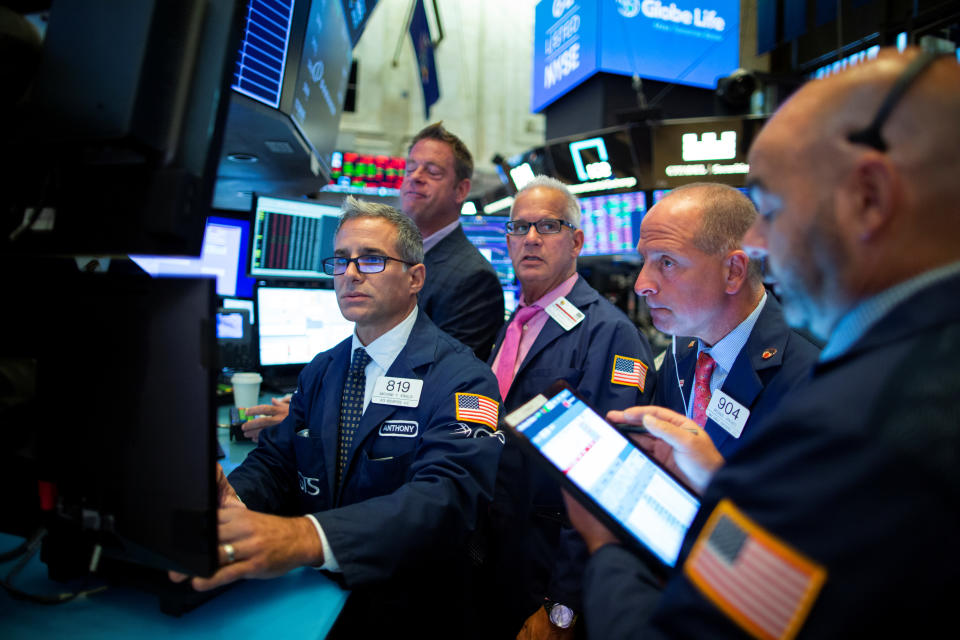Stock market news: August 13, 2019
U.S. stocks jumped after the Trump administration announced it would be delaying tariffs on certain goods from China beyond the previous September 1 deadline. The news also sent bond yields higher, after the curve flattened the most in more than a decade earlier in the session.
Here’s where markets ended Tuesday:
S&P 500 (^GSPC): +1.48%, or 42.57 points
Dow (^DJI): +1.44%, or 372.54 points
Nasdaq (^IXIC): +1.95%, or 152.95 points
10-year Treasury yield (^TNX): +6 bps to 1.7%
U.S. dollar to onshore Chinese yuan rate (CNY=X): -0.2593% to 7.0394
The Office of the U.S. Trade Representative announced Tuesday morning that products including “cell phones, laptop computers, video game consoles, certain toys, computer monitors, and certain items of footwear and clothing” would not be hit with a 10% tariff until December 15. Originally, President Donald Trump announced at the start of August that he would be imposing a 10% tariff on $300 billion worth of Chinese imports starting September 1, which would have included many of these items.
“Certain products are being removed from the tariff list based on health, safety, national security and other factors and will not face additional tariffs of 10 percent,” the USTR said in a statement.
Shares of Apple (AAPL) led the Dow higher, with the iPhone-maker’s stock up more than 4% after the USTR’s statement.
“For Apple, which has become the poster child of this US/China UFC trade battle, this is a major shot in the arm for the bulls as importantly Cook & Co. will be facing no tariff noise/costs when the trifecta of iPhones launch in the September time-frame,” Wedbush analyst Dan Ives wrote in a note. “While uncertainty will pressure Apple's stock/multiple, seeing the forest through the trees the fundamental impact on iPhone production and potential cost increases look less onerous now with the USTR news.”
The USTR announcement came after China’s vice premier Liu He spoke with U.S. Trade Representative Robert Lighthizer and Treasury Secretary Steven Mnuchin over the phone Tuesday night, according to China’s state-run media agency Xinhua. Both sides agreed to conduct another call in two weeks following the discussions, which reportedly focused on the 10% tariffs on $300 billion worth of Chinese goods,
Earlier in the session, falling bond yields and a narrowing spread between the closely watched 10-year and 2-year yields sent contracts on the three major stock indices lower, before the USTR’s announcement sparked a resurgence in equities. Even after the news, shorter-term yields rose more than those on the longer end of the curve.

Uncertainty about the global outlook had also added to investor jitters, with geopolitical unrest mounting everywhere from Latin America to Asia.
Argentina’s peso plummeted to a record low of about 60 per dollar Monday and remained weaker than 50-per-dollar into Tuesday’s session, after center-right President Mauricio Macri performed worse-than-expected in primary elections over the weekend. The weak performance by the more market-friendly leader sent Argentine equities tumbling, with the Global X MSCI Argentina ETF (ARGT) down more than 24% Monday before paring some losses Tuesday morning.
Meanwhile, the People’s Bank of China fixed its yuan at 7.0326 per dollar Tuesday, marking the fourth straight session with the currency weaker than the psychological 7-per-dollar level. However, this was still stronger than expected by consensus analysts, according to Reuters-compiled estimates. The yuan against the U.S. dollar remains a closely monitored currency pair after the Treasury Department officially designated China a currency manipulator last week, amid an ongoing trade war with the U.S.
In Hong Kong, flights were canceled out of Hong Kong International Airport for a second consecutive day as pro-democracy protesters overtook the global transportation hub. This marked the fifth straight day that activists flooded the airport, with sit-ins starting in one of the busiest commuter centers in the world starting Friday.
Shares of Cathay Pacific (0293.HK), a Hong Kong-based airline, fell 2.5% Tuesday on the Hong Kong Stock Exchange, extending Monday’s declines. The airline said over the weekend that it would cooperate with China’s aviation authority prohibiting staff members who supported the Hong Kong protests from flying to and over mainland China.
Thousands of Hong Kongers have been galvanized to demonstrate against certain Hong Kong policies and police activities. Protests have now stretched into an eleventh week, after initial demonstrations were sparked over a government proposal for an extradition bill that would have allowed criminal suspects to mainland China for trials. While Beijing has condemned the demonstrations and thrown support to Hong Kong’s government to contain protesters, the Chinese government has not initiated military action into Hong Kong, which many observers said would be regarded as a move further undercutting Hong Kong’s semiautonomy.
Consumer prices edged up in July
Meanwhile, new economic data released Tuesday underscored a slight rise in inflationary pressures in the U.S., with consumer prices rising mostly in-line with expectations for July.
The Bureau of Labor Statistics’s headline consumer price index (CPI) rose 0.3% month-over-month in July, as anticipated. Over the last 12 months, consumer prices rose 1.8%, slightly above the 1.7% increase expected and June’s 1.6% increase, driven by a rise in gas and housing prices.
Excluding more volatile food and energy prices, CPI rose 0.3% month-over-month and 2.2% year-over-year in July, slightly ahead of the unchanged 2.1% pace from June expected. This was the second consecutive month that the so-called “core” CPI rose 0.3% on a monthly basis, and was above expectations for a 0.2% gain in core CPI for July.
—
Emily McCormick is a reporter for Yahoo Finance. Follow her on Twitter: @emily_mcck
Read more from Emily:
Economy adds 164,000 jobs in July, unemployment rate sits at 3.7%
Netflix’s 2Q global paid subscriber additions miss expectations
Tech companies like Lyft want your money – not ‘your opinion’
Follow Yahoo Finance on Twitter, Facebook, Instagram, Flipboard, LinkedIn, and reddit.
Read the latest financial and business news from Yahoo Finance
